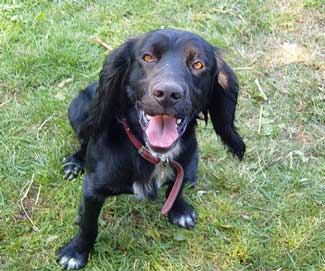- Home
- Best quality dog food
- Hypoallergenic dog food
Hypoallergenic Dog Foods
If your Cocker suffers from an allergy, a hypoallergenic dog food diet might be just the thing to get him back to full health. Understand the symptoms of dog food allergies and how hypoallergenic food can help.
Food Allergies In Dogs
If your Cocker Spaniel suffers from a dog food allergy you'll already know it's not much fun for him, but don't despair, help may not be very far away because a diet of hypoallergenic dog food, which is specially formulated to help fight allergies, might just do the trick!
 No allergies here!
No allergies here!And if your pet is lucky enough not to have an allergy, it doesn't necessarily mean that he won't suddenly develop an allergic reaction or an intolerance to a particular food at some point in the future. It's always a possibility.
However, if your dog does suffer from allergies you have a couple of options.
You can move him onto a hypoallergenic diet.
Or you can trial an exclusion diet, which will help to determine the cause of the allergy and allow you to remove the 'offending' food from his diet.
Read on to understand the difference between between the two.
The Hypoallergenic Dog Food Diet
In many cases of food allergies vets are recommending owners consider moving their dogs onto a diet of hypoallergenic food as it's often a simpler way to beat the allergy.
Dog food allergies are often linked to many of the chemicals found in manufactured pet foods such as artificial preservatives and colourings and fillers such as corn or wheat.
Alternatively an allergic reaction or an intolerance may be caused by a particular food and those known to trigger allergies are:
- Beef;
- Chicken;
- Lamb;
- Fish;
- Soy;
- Yeast;
- Dairy or milk products.
In a hypoallergenic dog food you'll find only natural, high-grade food. It will have had very little processing and will contain natural preservatives and colourings.
You won't find any harmful chemicals or artificial preservatives or flavours in this type of nourishment.
Nor will it contain other allergy triggering fillers such as corn or wheat, but may contain rice instead as it's less likely to trigger an allergy.
It's likely to contain lamb because it only causes an allergic effect in a small percentage of dogs.
Before deciding which hypoallergenic food is best for your dog, check the dog food ingredients label to confirm that it doesn't contain harmful chemical preservatives and that it includes a good ratio of quality protein and good carbohydrates, including vegetables and rice.
Your vet will be able to advise you further on nutritional values.
Your vet's surgery will probably sell good quality hypoallergenic pet food, (probably at a fairly inflated price) but it's also available in most good pet stores or via reputable on-line pet stores.
If your pet's symptoms don't show signs of easing after 3-4 weeks of being on a hypoallergenic diet, try changing to a different flavour, perhaps salmon instead of lamb, before trying the exclusion diet, explained below.
If you find a particular brand simply isn't working for your pet, you might like to try another brand to see if it makes a difference.
The Exclusion Diet
If hypoallergenic food doesn't do the trick, your vet may recommend an exclusion diet.
This is where all food is removed from your dog's diet with the exception of lamb and rice, for example. No other food is given to him for 3 weeks - no treats, no tit-bits, nothing!
If the symptoms stop and don't return after 3 weeks, other foods may be gradually added to his diet, allowing 3 weeks between introducing each new food item.
If and when the symptoms return, you're probably safe to assume that the last food returned to his diet is causing the allergy. Unfortunately, this can be a slow going process but if you'd like to learn more about the exclusion diet just follow this link.
Symptoms Of Dog Food Allergies
Some of the most typical symptoms of a food allergy can include:
 Come on Mum let's play ball!
Come on Mum let's play ball!- Digestive problems;
- Vomiting and diarrhoea;
- Recurring ear infections;
- A build up of dark wax in the ears;
- Itchy skin;
- Skin rash;
- Skin infections caused by scratching;
- Dry flaky skin;
- Hair loss;
- Hot spots;
- Paw biting;
- Obsessive licking, usually paws;
As we can see, food allergies can make your dog's life miserable and they won't go away on their own.
If you suspect your Cocker Spaniel may have an allergy, or if he's suffering any of the above symptoms, it's probably best to let your vet give him the once-over and get an accurate diagnosis before you consider switching your pet onto an allergy dog food.
Hypoallergenic Dog Foods: Summary
Hypoallergenic food for dogs is meant to reduce the potential for allergies, although it can never be totally hypoallergenic because what causes an allergy in one dog may not affect another - no two dogs are the same.
By switching to a hypoallergenic dog food (with your vet's blessing of course) and paying special attention to his diet, ie no treats, no leftovers, and making sure no-one else feeds him extra tit-bits, you should see an improvement in your dog's well-being within a few weeks.
Good luck to you both!
Photo Credits: Hypoallergenic Dog Food
1. Angela N at www.flickr.com
2. Simon Royal Free Photo Library at www.flickr.com - https://www.flickr.com/photos/simonsfreephotogallery/4055857016/


